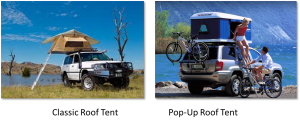Roof tents and annexes give you the option for additional bed spaces and accommodation, perhaps for your kids or an extra family guest. Some people without campers can use these types of tents to transform their vehicles giving them the capacity for overnight stays and camping adventures.
The roof tent dates back to 1958 where it was invented in Italy by Italian manufacturer ‘Autohome’. Autohome is one of the market leaders of roof tents and accessories with over fifty models in their current range.
Roof tents are popular with overland explorers who can simply install these products to their expedition 4x4s giving them accommodation space without the need to use the more expensive option of an expedition vehicle such as a Unimog or similar. However, these tents are now becoming more popular with a variety of different vehicle owners for leisure and travel purposes. Campervan roof tents give the owner of smaller vehicles more choice with regards accommodation and negate the need to erect ground tents.
Some roof tents are specific to certain vehicles but a lot are capable of being fitted to almost any vehicle. Autohome claim they can supply roof racks to accommodate a roof tent for any vehicle, except cabriolet models. Their FAQ page has lots of useful information:
http://www.autohome-official.com/en/products/customer-service/faq
Roof tents come in a large variety of shapes, materials and styles all with different features and suitability for different types of travel/expedition. Roof tents are usually categorised as ‘classic’ or ‘pop-up’ type.
Classic Roof Top Tent
These types of roof tents are constructed with a solid base plate made from plywood or a composite material with two hinged base plates. The pulling of the ladder opens up the sandwich of the base plates to erect the framework of the tent. The speedy erection of this type of tent can be seen in the link below:
https://www.youtube.com/watch?v=5TBrqHlGd-E
Classic roof tents usually have integral foam mattresses to sleep on. Depending on the model and vehicle these types of roof tents can be positioned to open out to the side, rear or front of the vehicle, or across the whole length of the vehicle for larger roof tents. The tents are usually configured with openings at the front and rear and have large windows on the sides for good ventilation.
Pop-Up Roof Tent
These are usually constructed from fibreglass with a bottom and top section that pops up to form your accommodation. The walls are made from high performance anti-condensation materials and come with different openings depending on the model. Pockets and storage areas feature in some to house your torch or midnight snacks!
Like the classic roof tent there is usually some storage space under the tent when closed. You can also fit racks to some pop-up tents to carry kayaks, surf boards and the like. Pop-up tents are usually limited in size to the width of the vehicle, this being one downside compared to the classic type of roof tents.
Annexes
There are a variety of different types of annex that fit to roof tents or other parts of a vehicle to provide more space, whether it is for accommodation, changing, kitchen or other uses.
Which Roof Tent
This all depends on many factors such as:
- Size of accommodation required
- Speed of erection
- Camping conditions i.e. heat, rain, cold
- Budget
- Type of vehicle
- Tent annexes
There are many manufacturers of this type of tent all with many different models to suit varying budgets and performance/lifestyle requirements. We suggest you carefully consider all of the above before deciding to purchase a particular roof tent.
A good way to view these types of tent is to attend one of the many camping and outdoor exhibitions throughout the year where the manufacturers are showing their products.
You can also get a roof tent to fit many smaller vehicles so you do not have to own a Land Rover or campervan to enjoy this type of camping.
Written by Glenn Adama






